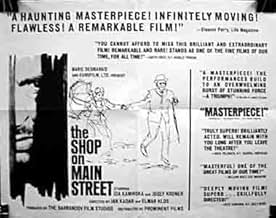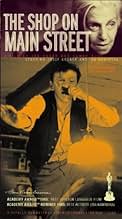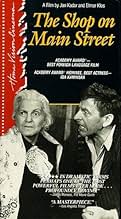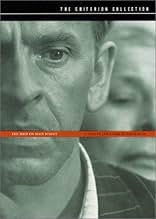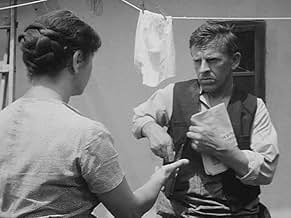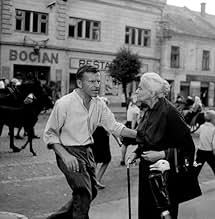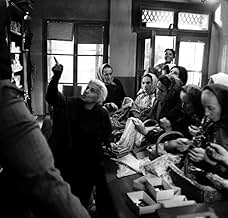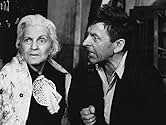Tono Brtko, um camponês, é nomeado inspetor ariano de uma pequena loja comandada por Rozalia, uma viúva judia. Os dois acabam tornando-se amigos, mas é dada a ordem para que os judeus sigam ... Ler tudoTono Brtko, um camponês, é nomeado inspetor ariano de uma pequena loja comandada por Rozalia, uma viúva judia. Os dois acabam tornando-se amigos, mas é dada a ordem para que os judeus sigam para campos de trabalho.Tono Brtko, um camponês, é nomeado inspetor ariano de uma pequena loja comandada por Rozalia, uma viúva judia. Os dois acabam tornando-se amigos, mas é dada a ordem para que os judeus sigam para campos de trabalho.
- Direção
- Roteiristas
- Artistas
- Ganhou 1 Oscar
- 6 vitórias e 4 indicações no total
- Rozalia Lautmannová
- (as Ida Kaminská)
- Markus Kolkocký
- (as Frantisek Zvarík)
- Young Man
- (não creditado)
- Eliasová
- (não creditado)
- Jewish Man
- (não creditado)
Avaliações em destaque
When Tony finds himself as assistant to an old lady at her failing notions shop (which he "legally" was entitled to take over), he learns about the Jewish community, how everyone looked out for one another, and how these people were no different from other folk in town, if anything they were more human than the rest. Still afraid of retribution from the Nazis and their sympathisers, Tony is in a no-win-situation.
The final scene of this 1966 Best Foreign Film Oscar Winner was likely an inspiration for the final scene in the 1997 Blockbuster "Titanic". This cinematic gem serves as a reminder to the old German saying "Leben und leben lassen" (live and let live). A classic indeed!
The movie achieves that rarest feat of being able to portray one of the most horrendous experiences in human history without resorting to sensationalism or sentimentality.
The acting of Josef Kroner and Ida Kaminska is without peer and the musical score is quite simply haunting and adds immeasureably to the film's overall effectiveness.
Make every effort to see this true cinematic masterpiece.
As the editor and publisher of the memoir of a Jewish Holocaust survivor from Slovakia, I can aver that this movie is achingly true to life. The film's setting could be this woman's hometown. Like Mrs. Lautmann in the movie, this woman had lived behind one of the family's shops on her hometown's Main Street and her family's properties were seized during the Aryanization depicted in this movie.
How the writer, director, and actors of this seemingly small film were able to condense and convey so much of the socio-economic and political tenor of that time and place, with such acumen, dark humor, and pathos is astounding.
It seamlessly moves toward an inexorable conclusion, with each successive scene leading the viewer deeper into the world of the two protagonists and reeling from the truths that the filmmakers expertly offer up.
It is days after viewing it, and still, I cannot shake this movie.
Yes, the movie has to do with the tragedy of Jewish people in the poisoned and poisonous Europe of the WWII period, but the emotional implications go much farther than that. They address human condition in general. It is one of those egregiously few movies which make a "philosopher" out of each of us. . . even if for a minute only. . . even if we only philosophize with our unstoppable tears. I am not one to weep easily at movies, but I defy you to watch this fabulous work of cinema without being touched to the deepest fiber of your soul.
Yes, it is that good. One of the very few movies which are better than GREAT MUSIC. Watch it - preferably on the Criterion DVD, the VHS edition leaves a lot to be desired. Unless you are an unfeeling freak, no offense intended, it is very unlikely that you will ever regret it.
Você sabia?
- CuriosidadesThis movie was shot exclusively in the small Slovak city of Sabinov.
- Erros de gravaçãoSet in 1942, a German troop train moves through the town. The train is carrying Soviet cold-war era trucks and anti aircraft guns that didn't exist until the 1950s. It's understandable for them to make this substitution since any authentic German equipment would have been scrapped long before.
- Citações
Jozef Katz: I don't understand anything any more. But I know one thing. When the law persecutes the innocent, that's the end of it. And those who make the law, too.
- ConexõesEdited into CzechMate: In Search of Jirí Menzel (2018)
- Trilhas sonorasÉn vagyok a falu rossza egyedül
(uncredited)
Written by Lajos Békésy, Imre Garsi and László Patak
Performed by Jozef Kroner, Frantisek Zvarík, Hana Slivková and Elena Zvaríková
Principais escolhas
Detalhes
- Tempo de duração
- 2 h 8 min(128 min)
- Cor
- Mixagem de som
- Proporção
- 1.37 : 1


